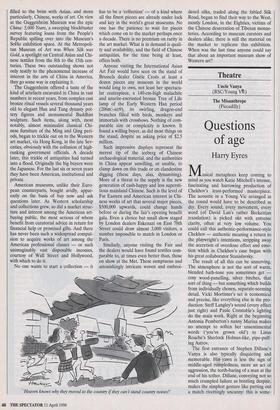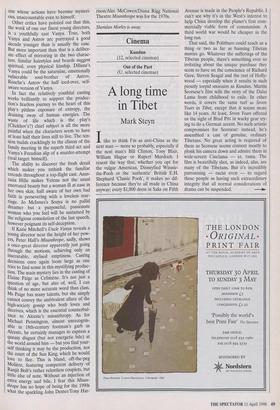Theatre
Uncle Vanya (RSC/Young Mb) The Misanthrope (Piccadilly)
Questions of age
Harry Eyre s
Musical metaphors keep coming to mind as you watch Katie Mitchell's intense, fascinating and harrowing production of Chekhov's least-performed masterpiece. The acoustic in a Young Vic arranged in the round would have to be described as dry. Every sound, every movement, every word (of David Lan's rather Beckettian translation) is picked out with extreme clarity, often at very low volume. You could call this authentic-performance-style Chekhov — authentic meaning a return to the playwright's intentions, stripping away the accretion of overdone effect and emo- tion which in Chekhov's case began with his great collaborator Stanislaysky.
The result of all this can be unnerving. The atmosphere is not the sort of warm, blended bath-tone you sometimes get cosy wood-panelling, silver birches, that sort of thing — but something which builds from individually chosen, separate-seeming detail. Vicki Mortimer's set is economical and precise, like everything else in the pro- duction: Steff Langley's sound (every effect just right) and Paule Constable's lighting do the main work. Right at the beginning Antonia Pemberton's nanny Marina makes no attempt to soften her unsentimental words (`you've grown old') to Linus Roache's Sherlock Holmes-like, pipe-puff- ing Astrov.
The first entrance of Stephen Dillane's Vanya is also typically disquieting and memorable. Hi# yawn is less the sign of middle-aged rumpledness, more an act of aggression, the teeth-baring of a man at the end of his tether. Dlllane, conveying not so much crumpled failure as bristling despair, makes the simplest gesture like putting out a match rivettingly uncanny: this is some- one whose actions have become mysteri- ous, unaccountable even to himself.
Other critics have pointed out that this, the work of one our finest young directors, is a youthfully cast Vanya. True, both Vanya and Astrov are portrayed a good decade younger than is usually the case. But more important than that is a deliber- ate effect of mirroring in the two charac- ters. Similar hairstyles and beards suggest spiritual, even physical kinship. Dillane's Vanya could be the saturnine, emotionally vulnerable soul-brother of Astrov, Roache's Astrov the half iced-over, self- aware version of Vanya. In fact the relatively youthful casting works brilliantly to support the produc- tion's fearless journey to the heart of this play's pitiless exposure of entropy, the draining away of human energies. The waste of life which is the play's (Chekhov's?) chief subject is all the more painful when the characters seem to have at least half their lives still to live. The ten- sion builds cracklingly to the climax of the family meeting in the superb third act and Vanya's Freudian slip of a murder-attempt (real target: himself). The ability to discover the fresh detail which makes you rethink the familiar extends throughout a top-flight cast. Anas- tasia Hille makes Yelena not the usual enervated beauty but a woman ill at ease in her own skin, half aware of her own bad faith in persevering with a loveless mar- riage. Jo McInnes's Sonya is no pallid dreamer but a purposeful, passionate woman who you feel will be sustained by the religious consolation of the last speech, however poignant its self-deception. If Katie Mitchell's Uncle Vanya reveals a young director near the height of her pow- ers, Peter Hall's Misanthrope, sadly, shows a once-great director apparently just going through the motions, achieving only an inscrutable, stylised emptiness. Casting decisions once again loom large as one tries to find sense in this mystifying produc- tion. The main mystery lies in the casting of Elaine Paige as Celimene. It's not just a question of age, but also of, well, I can think of no more accurate word than class. Ms Paige has many talents, but she simply cannot convey the ambivalent allure of the high-society gossip who both loves and deceives, which is the essential counterbal- ance to Alceste's misanthropy. As for Michael Pennington, almost unrecognis- able in 18th-century footman's garb as Alceste, he certainly manages to express a queasy disgust (but not energetic bile) at the world around him — but you find your- self thinking it may be the production, not the court of the Sun King, which he would love to flee. This is bland, off-the-peg Moliere, featuring competent delivery of Ranjit Bolt's rather relentless couplets, but little else of note. Without an injection of extra energy and bile, I fear this Misan- thrope has no hope of being for the 1990s what the sparkling John Dexter/Tony Har- rison/Alec McCowen/Diana Rigg National Theatre Misanthrope was for the 1970s.



































































 Previous page
Previous page